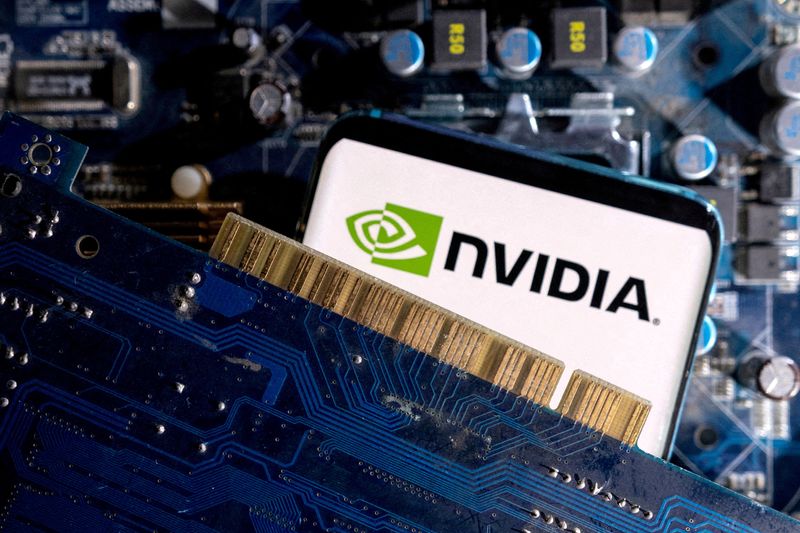By Suzanne McGee
(Reuters) - Making leveraged bets on Nvidia is likely to get much riskier if Wall Street's tech-led selloff continues.
Exchange-traded funds (ETFs) designed to magnify the daily moves in the chipmaker's shares by as much as two times have been a popular vehicle for investors seeking to jump on the stock's meteoric rise this year, with total assets swelling to about $6.3 billion as of this week from only $342 million in December 2023, according to data from CFRA.
But while the stock's roughly 130% year-to-date rally has rewarded bullish bets, recent turbulence in tech shares could amp up the risk for traders seeking to profit from Nvidia's gyrations.
Nvidia's shares fell by nearly 7% in Wednesday's selloff, taking the leveraged ETFs down by as much as 13.5%. The S&P 500 index fell 2.3%, its worst loss since late 2022, as investors reacted to disappointing earnings from Tesla (NASDAQ:TSLA) and Google (NASDAQ:GOOGL). The chipmaker's shares were down about 3% on Thursday.
More turbulence could come next week, as investors await results from Apple (NASDAQ:AAPL), Microsoft (NASDAQ:MSFT) Facebook-parent Meta and Amazon.com (NASDAQ:AMZN).
"Leverage goes both ways," said Todd Sohn, ETF analyst at Strategas Securities. "It's great in a bull market, but when expectations are so high that any nerves cause a stock to unwind, the selloff is painful and quick."
The popularity of these ETFs is another example of how the eye-watering surge in Nvidia's shares has pushed investors to ramp up exposure to the stock, even as they increase the risks to their portfolios if the company's fortunes turn.
"Leveraged ETFs are for people who are comfortable with risk," Will Rhind, the CEO of GraniteShares, told Reuters in the latest episode of Inside ETFs.
'VOLATILITY DRAG'
While it's not yet clear whether investors were net buyers of leveraged ETFs tied to big tech stocks across the board during Wednesday's selloff, both GraniteShares and REX Shares, two of the asset managers that offer these products tied to Nvidia, said traders used the selloff as an opportunity to buy.
That would be consistent with investors' behavior over the past few weeks. The GraniteShares 2x Long Nvidia Daily ETF, which offers traders a daily return of double Nvidia's movements higher or lower, has attracted $1.06 billion of net inflows in the last month, during which Nvidia's shares had fallen by nearly 6% up to Wednesday.
Meanwhile, the T-Rex 2x Long Nvidia Daily Target (NYSE:TGT) ETF has seen inflows on days when Nvidia's share price has fallen, according to flows data from the company, and has pulled in $75.7 million since the beginning of June.
The run-up in Nvidia's shares has also bolstered the leveraged ETFs' popularity with short sellers, who seek to profit from stock declines. Short interest in the GraniteShares ETF hovered around 15% of outstanding shares for the first half of July, compared to 1% in April, data from Vanda Research showed.
These ETFs can be risky for those who don't use them as day trading vehicles - which they are intended to be - and hold longer term, analysts said.

Doing so can make investors vulnerable to so-called "volatility drag," a phenomenon that over time can magnify gains or losses even beyond the leverage the fund provides. That could compound losses in a down market, because issuers reset the exposure to Nvidia's underlying stock price every day.
"In choppy markets, these leveraged products that have to buy the underlying stock when it goes up and sell when it goes down can get crushed," said Bryan Armour, ETF analyst at Morningstar.